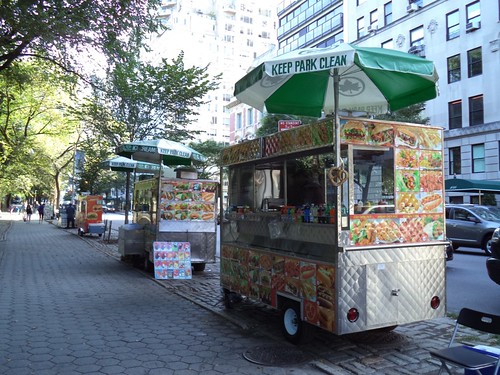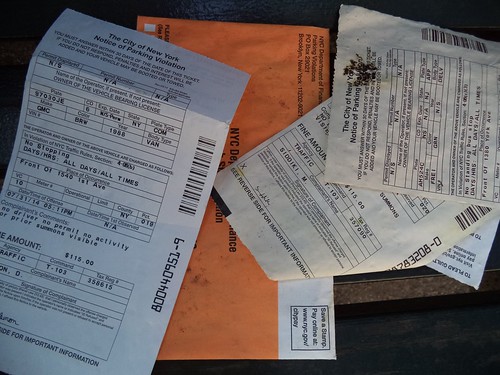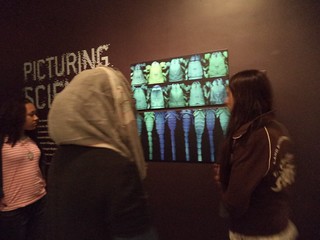New York City is so...invigorating, eye-opening, contemplation-making. There is a stark contrast between the community of my life in Poughkeepsie and that community that I see here. As I make my way to the Museum, I walk through rich and poor neighborhoods, some people walk their dogs and take up lot's of space on the sidewalks, some are asking for money with a sign, some have on work uniforms as they hustle to catch the subway. There are young kids walking with huge backpacks to get to summer day camp bus pick-up, there are babies in strollers who look nothing like the women pushing the prams, and there are stinky streets everywhere.
New York, it's a nice place to visit, but I wouldn't want to live here.
And do people even pay their parking tickets in NY?! I find one or two each morning walking in through Central Park.
Pages
8.22.2014
More About the Master of Arts in Teaching Program at AMNH - Videos!
I stumbled on these videos today and thought I should post them. What they present about the MAT program is pretty close to my own experience.
8.11.2014
Three weeks of Co-teaching
We wrapped a three-week stint of co-teaching in the Lang Science program at the Museum. Lang is a unique program that brings kids from all around New York City to learn a science topic (or multiple topics) over three weeks. But it's not just one and done. There's an application process and the program starts when kids are going into the sixth grade and they stay with it until they graduate from high school. Every summer. For seven summers. Wow! Not only that. The Langsters commit to coming to the Museum for 18 additional Saturdays throughout the school term. That is a lot of science and a lot of love for science learning on the part of the young people in Lang. The MAT program is incorporated into the Lang program by having us co-teach lessons (that's me teaching about chemical weathering and stratigraphy), guide Lang students on research design, work with the lead Lang instructor on activities and whatever other way we can see ourselves jumping in to help out.
The following is a blog post that I wrote in Moodle. Moodle is a learning management system and no one, outside of my classmates, my instructors, and maybe the MAT program administration, can see these posts we make and the comments to those posts. I do not like Learning Management Systems, but I have used them as a student, I have used them as an instructor, and my children have had to use them, so I can see the efficacy of using one. I just don't like them. So I am freeing some of the content that's hidden away. This post was more of a comment to a thread on class and privilege that I felt compelled to respond to and then felt I wanted to share with this blog.
So, the week with the Lang 7th graders has come and, sadly, gone. What a wonderful group! I will miss them and will be more than glad to take a position as a middle school teacher.
About the socio-economic dynamics much discussed here…I didn’t really see it. I mean, I did not see it being a problem in the learning environment. Sure, there were the kids who were all aflutter about going to one of the other kid’s country house. (It was probably in or near Poughkeepsie, BTW.) It was only the girls who got to go, so I felt badly for the boys. At least one of the girls was not going ("my mom said we have something to do that day") and I felt badly for her, too. But, frankly, I don’t think I’d want my daughter going (by limo!) to a country house so she can feel like she has a life that is less-than or more suck-ish than this kid’s life.
OK, that aside, I feel like almost all of the learners spoke up in Lang 7th grade. I did not see the "rich" kids speaking more than the "financial aid" kids. (And I did not see an economic divide at all in the 9th to 12th research group.) I mean, how do we really know who has money and who doesn't? I did not get that list. We could make major assumptions, but perhaps the kid who talked about walking to the bottom of the Grand Canyon was not really bragging, she might have been lying or she might have been a college professor’s child. Or her family is middle class and they know that trips like that are good for kids' development.
So much of what a kid goes through in life is dependent upon the zip code he or she is unlucky (or lucky) enough to be born into and those economics are passed along through the generations. The pull-yourself-up-by the-bootstraps American ethos is a myth, IMO. We need to treat all kids like they are born into the high-rent district and teach like all kids belong in a program like Lang. That is our challenge.
What is clear is that, if I imagine myself teaching in the high-needs school in my neighborhood, I will see in my classroom kids mostly from low-income families. Some of them will be homeless. But there are pockets in my area, in that school district, that are middle class and upper middle class. Some of those kids will go on summer trips to The Shore or will have passports with stamps in them, but some will have never left Poughkeepsie. I want all of them to feel like they can raise their hand, add their thoughts and observations, and know in their hearts that I think that what they have to say is important and matters.
The following is a blog post that I wrote in Moodle. Moodle is a learning management system and no one, outside of my classmates, my instructors, and maybe the MAT program administration, can see these posts we make and the comments to those posts. I do not like Learning Management Systems, but I have used them as a student, I have used them as an instructor, and my children have had to use them, so I can see the efficacy of using one. I just don't like them. So I am freeing some of the content that's hidden away. This post was more of a comment to a thread on class and privilege that I felt compelled to respond to and then felt I wanted to share with this blog.
So, the week with the Lang 7th graders has come and, sadly, gone. What a wonderful group! I will miss them and will be more than glad to take a position as a middle school teacher.
About the socio-economic dynamics much discussed here…I didn’t really see it. I mean, I did not see it being a problem in the learning environment. Sure, there were the kids who were all aflutter about going to one of the other kid’s country house. (It was probably in or near Poughkeepsie, BTW.) It was only the girls who got to go, so I felt badly for the boys. At least one of the girls was not going ("my mom said we have something to do that day") and I felt badly for her, too. But, frankly, I don’t think I’d want my daughter going (by limo!) to a country house so she can feel like she has a life that is less-than or more suck-ish than this kid’s life.
OK, that aside, I feel like almost all of the learners spoke up in Lang 7th grade. I did not see the "rich" kids speaking more than the "financial aid" kids. (And I did not see an economic divide at all in the 9th to 12th research group.) I mean, how do we really know who has money and who doesn't? I did not get that list. We could make major assumptions, but perhaps the kid who talked about walking to the bottom of the Grand Canyon was not really bragging, she might have been lying or she might have been a college professor’s child. Or her family is middle class and they know that trips like that are good for kids' development.
So much of what a kid goes through in life is dependent upon the zip code he or she is unlucky (or lucky) enough to be born into and those economics are passed along through the generations. The pull-yourself-up-by the-bootstraps American ethos is a myth, IMO. We need to treat all kids like they are born into the high-rent district and teach like all kids belong in a program like Lang. That is our challenge.
What is clear is that, if I imagine myself teaching in the high-needs school in my neighborhood, I will see in my classroom kids mostly from low-income families. Some of them will be homeless. But there are pockets in my area, in that school district, that are middle class and upper middle class. Some of those kids will go on summer trips to The Shore or will have passports with stamps in them, but some will have never left Poughkeepsie. I want all of them to feel like they can raise their hand, add their thoughts and observations, and know in their hearts that I think that what they have to say is important and matters.
Subscribe to:
Comments (Atom)








